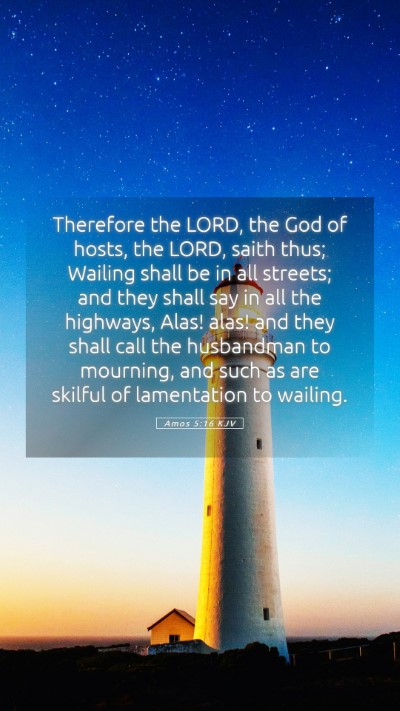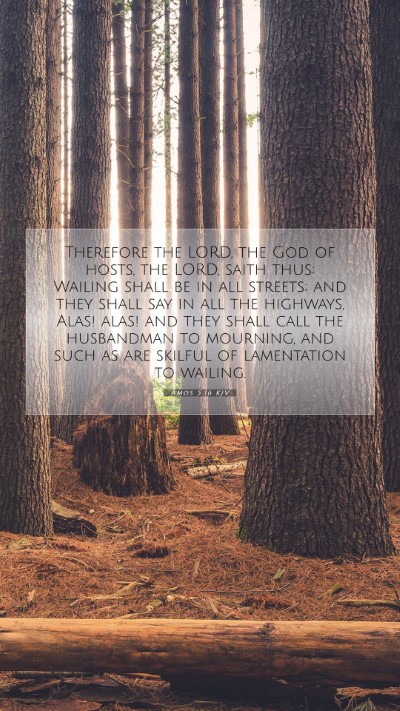Old Testament
Genesis Exodus Leviticus Numbers Deuteronomy Joshua Judges Ruth 1 Samuel 2 Samuel 1 Kings 2 Kings 1 Chronicles 2 Chronicles Ezra Nehemiah Esther Job Psalms Proverbs Ecclesiastes Song of Solomon Isaiah Jeremiah Lamentations Ezekiel Daniel Hosea Joel Amos Obadiah Jonah Micah Nahum Habakkuk Zephaniah Haggai Zechariah MalachiAmos 5:16 Meaning
What is the meaning of Amos 5:16?
Therefore the LORD, the God of hosts, the LORD, saith thus; Wailing shall be in all streets; and they shall say in all the highways, Alas! alas! and they shall call the husbandman to mourning, and such as are skilful of lamentation to wailing.
Amos 5:16 Bible Verse Meaning
Understanding Amos 5:16
The verse Amos 5:16 states: "Therefore thus saith the Lord God of hosts, the Lord; Wailing shall be in all streets; and they shall say in all the highways, Alas! alas! and they shall call the husbandmen to mourning, and such as are skillful of lamentation to wailing."
Overview of the Verse
This passage occurs within a prophetic context where Amos warns Israel of impending judgment due to their social injustices and spiritual complacency. The poetical nature of the verse illustrates a period of deep grief and mourning, underscoring the severe consequences of sin and the lack of sincere repentance among the people.
Biblical Exegesis of Amos 5:16
According to Matthew Henry, this verse conveys a clear message of impending disaster. The anticipated wailing is not merely reflectively lamentable; it indicates the gravity of the situation where divine wrath has been provoked by a people who have ignored social justice and true religious practices. Henry emphasizes the communal aspect of mourning, as the streets and highways become the settings of sorrow.
Albert Barnes further elucidates that the qualitative aspects of mourning invoke an image of widespread devastation. The call for skilled mourners portrays a society in which skilled individuals are needed to express the depth of grief that failure to heed God’s warnings has brought upon the nation. Barnes holds that this serves as a prophetic outcry directed at the incapacity of the Israelites to respond appropriately or repent for their actions.
Adam Clarke reflects on the cultural importance of mourning in ancient Near Eastern societies, noting that this was not merely an emotional display but was integrated into the daily lives of the people, influencing their social fabric. Clarke points out that calling upon professional mourners signals the seriousness of the forthcoming desolation designated by prophetic word, indicating that their fate is dire.
Implications and Applications
This verse serves several practical reflections and applications for modern readers:
- Warning Against Complacency: The passage emphasizes the need for self-examination regarding personal and communal sins.
- Call to Genuine Repentance: It prompts individuals to consider their standing before God and compels a response of sincere remorse in light of divine expectations.
- Social Justice Awareness: This verse calls believers to be vigilant against societal injustices, resonating strongly with the importance of safeguarding the welfare of the vulnerable.
Related Cross References
- Jeremiah 9:17-19: Discusses mourning and lamentation in response to sin.
- Ezekiel 30:2-3: Speaks of lamentation over the impending ruin of Egypt, contextualizing judgment and grief.
- Matthew 23:37: Jesus laments over Jerusalem, expressing sorrow for the city that has rejected Him.
In-Depth Analysis and Study Tools
For those seeking more comprehensive study insights and understanding of this Bible verse, consider utilizing resources such as:
- Bible Commentaries: Texts containing exegesis and verse-by-verse interpretations.
- Bible Study Guides: Themed lessons that contextualize scripture within broader biblical themes.
- Online Bible Study Platforms: Interactive resources that facilitate group and individual exploration of Scripture, helping users understand complex passages.
This enhances the learning experience and provides applicable lessons for daily life.
Conclusion
Amos 5:16 serves as a sobering reminder of the consequences of turning away from God's commandments and the importance of active, heartfelt engagement in both personal and societal righteousness. The call for mourning encapsulated in this verse invites introspection towards how we live our lives in obedience to God.


